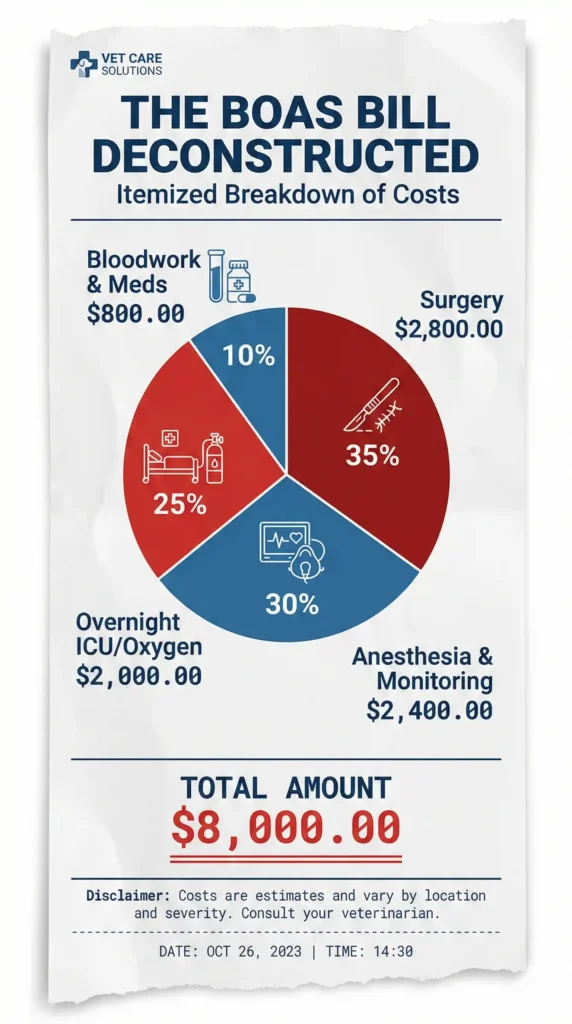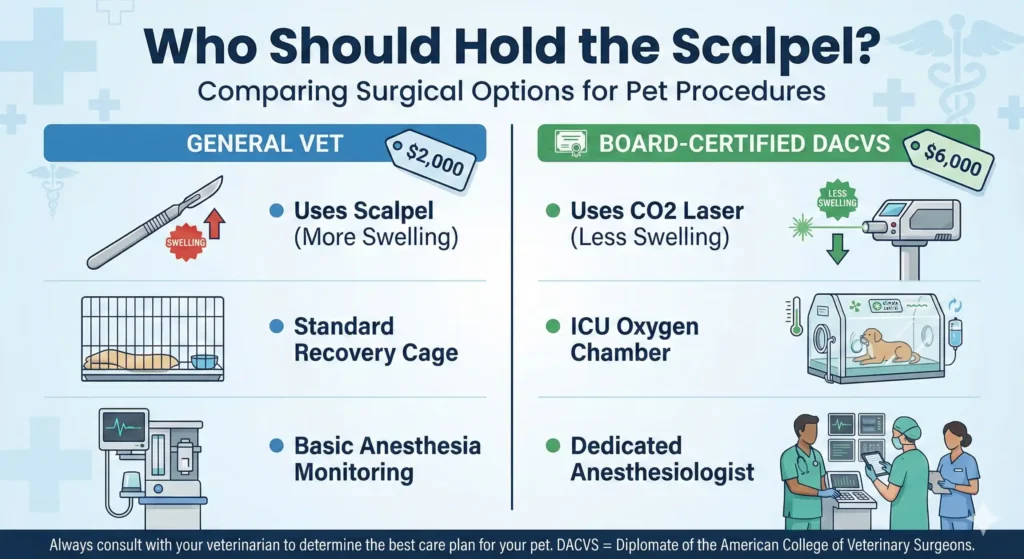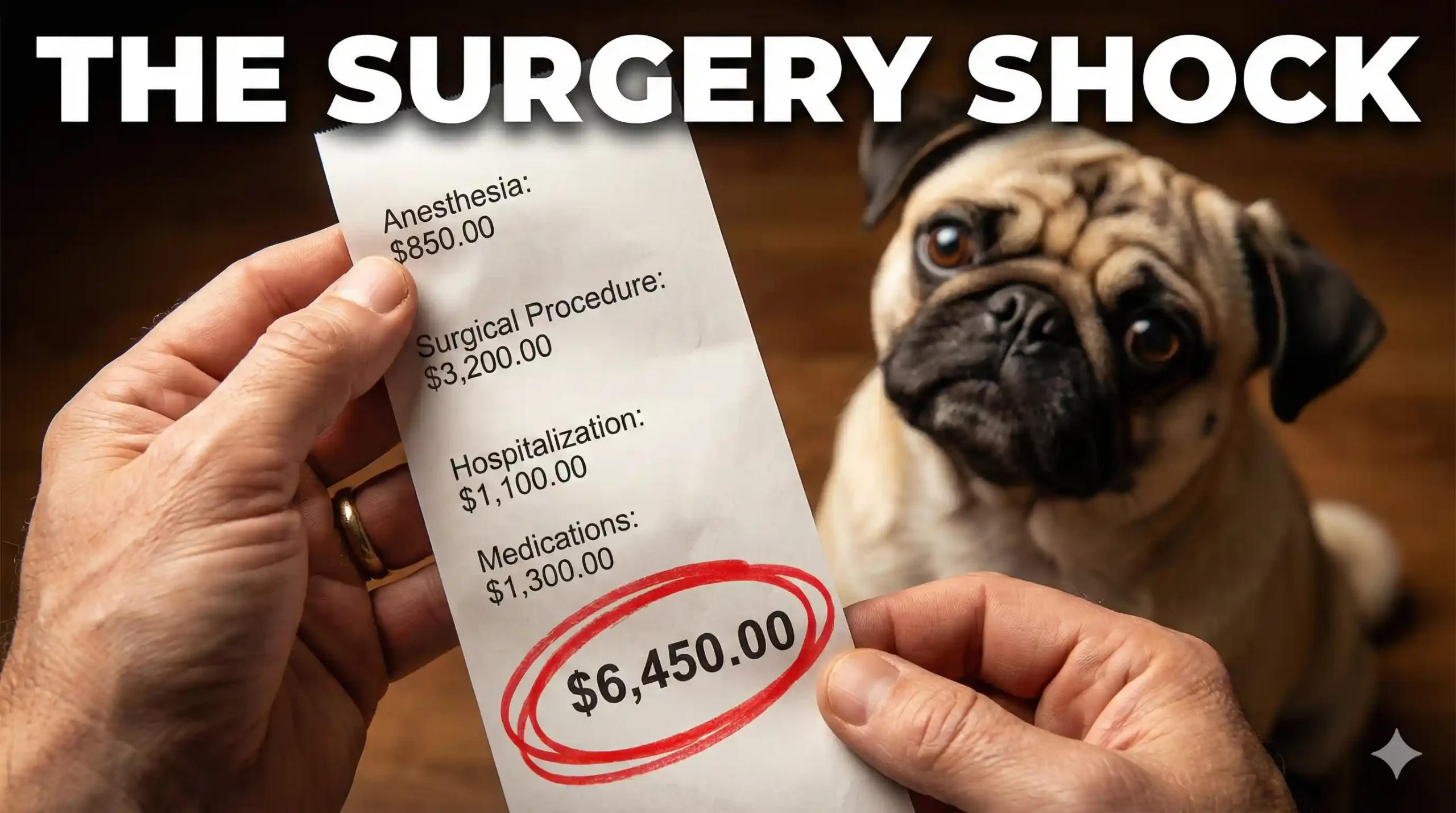The Sticker Shock: Unpacking the BOAS Estimate
When you finally take your gasping French Bulldog or Pug to the vet and the surgeon hands you the printed estimate, your heart drops.
You expected maybe $1,500. Instead, you are staring at a piece of paper that says **$6,450**.
When I review these surgical estimates from owners across the US, the first reaction is always anger. “Are they ripping me off? Why does widening a couple of nostrils cost more than a used car?”
The truth is, Brachycephalic Obstructive Airway Syndrome (BOAS) is not a simple “snip and stitch” procedure. You are not just paying for a surgeon’s time; you are paying for an intensive care environment required to keep a high-risk dog alive while they are unconscious.
Let’s break down exactly where your money goes in 2026, how to spot inflated fees, and why the “cheapest” quote might actually be the most dangerous.
The Anatomy of a $6,000 Vet Bill
When you look at your itemized estimate, you will notice the actual surgery is only a fraction of the cost. The massive price tag comes from the pre-op and post-op care.
Here is what a standard board-certified specialist invoice looks like in a mid-to-high cost of living state:
| Line Item | What It Is | Estimated Cost (2026) |
| Pre-Op Bloodwork & X-Rays | Checking heart/lungs before anesthesia. | $250 – $400 |
| Anesthesia & Monitoring | The highest risk part of the procedure. | $600 – $1,200 |
| Soft Palate Resection | Shortening the flap of skin in the throat. | $800 – $1,500 |
| Stenotic Nares Repair | Widening the pinched nostrils. | $400 – $800 |
| Everted Laryngeal Saccules | Removing swollen tissue deep in the airway. | $300 – $600 |
| Overnight ICU & Oxygen | 12-24 hours in an oxygen-rich recovery cage. | $800 – $1,500 |
| Medications | Painkillers, sedatives, anti-inflammatories. | $100 – $200 |
| Total Out-of-Pocket | The Final Bill | **$3,250 – $6,200+** |

Why Anesthesia Costs Double for Flat-Faced Dogs
If you look at the table above, you will see that anesthesia and monitoring can cost over a thousand dollars. If you were neutering a Greyhound, the anesthesia would be a fraction of that. Why the “Frenchie Tax”?
Putting a brachycephalic dog to sleep is incredibly dangerous. Because their airways are already compromised, the moment the sedative hits, their throat tissue collapses. To prevent suffocation, the veterinary team must act with lightning speed.
According to the American Veterinary Medical Association (AVMA) guidelines on anesthesia, flat-faced breeds require specialized intubation tubes, dedicated technicians who monitor their blood oxygen levels every single second, and specific fast-acting drugs that are more expensive than standard sedatives. You are paying for a highly trained human to watch your dog breathe for three straight hours.
The Specialist Premium: General Vet vs. Board-Certified
You can definitely find a local, general practice veterinarian who will offer to do BOAS surgery for $1,800.
Should you do it? In my experience, it is a massive gamble.
When you get a quote for $5,000+, it is usually from a DACVS (Diplomate of the American College of Veterinary Surgeons). The American College of Veterinary Surgeons clearly states that repairing the soft palate and removing laryngeal saccules requires immense precision.
If a general vet cuts the soft palate too short, food and water will go straight into your dog’s lungs (causing aspiration pneumonia). If they cut it too long, the dog still can’t breathe.
Board-certified surgeons also typically use CO2 Lasers instead of scalpels. Lasers cauterize the tissue as they cut, meaning zero bleeding and drastically reduced swelling in the throat. That laser machine costs the clinic $40,000, which is why your bill is higher. When dealing with the airway, you want the laser.

How Pet Insurance Changes the Math
Facing a $6,000 bill is terrifying, which is why securing pet insurance before the snoring starts is your greatest financial weapon.
If you have a policy that covers hereditary conditions with a 90% reimbursement rate and a $500 deductible, the math completely flips.
Instead of draining your savings account or taking out a massive loan, you pay the $6,000 at the vet, submit your invoice, and the insurance company cuts you a check for **$4,950**. Your total out-of-pocket cost drops to just your deductible and a 10% co-pay.
Just remember: if your vet has ever written “stenotic nares” or “respiratory noise” in your dog’s chart before your policy’s waiting period was over, the insurer will deny the entire surgery as a pre-existing condition.
Frequently Asked Questions (FAQs)
Can I use CareCredit for BOAS surgery?
Yes. Almost all major veterinary surgical centers in the US accept CareCredit. If you are approved, they often offer promotional financing (like 6 to 12 months with 0% interest) which gives you time to wait for your pet insurance reimbursement check to clear.
Does BOAS surgery actually work?
For the vast majority of dogs, yes. While it will not give a Pug the cardiovascular endurance of a Border Collie, owners consistently report that post-surgery, their dogs sleep silently, stop choking on their food, and have significantly more energy during the summer months.
Why is an overnight ICU stay mandatory?
When a Frenchie wakes up from airway surgery, their throat is irritated and swollen. If they panic, the swelling can cut off their airway entirely. Hospitals require them to stay overnight in a climate-controlled oxygen cage with 24/7 staff observation so they can intervene immediately if the dog starts turning blue.
YMYL & Financial Disclaimer: The information provided on Flat Face Insurance is for educational and consumer advocacy purposes based on my independent research of US veterinary costs. I am not a licensed veterinarian or a financial advisor. Veterinary pricing varies drastically by city, clinic, and your dog’s specific medical needs. Always consult directly with a board-certified veterinary surgeon for an accurate surgical estimate.
